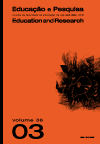Hannah Arendt: pensar a crise da educação no mundo contemporâneo
DOI:
https://doi.org/10.1590/S1517-97022010000300012Palabras clave:
Arendt, Educação, Crise, CríticaResumen
Dividido em três etapas complementares, o presente artigo discute a reflexão de Hannah Arendt sobre a crise da educação no mundo contemporâneo. Na primeira parte se estabelecem algumas conexões teóricas gerais entre as teses de Arendt a respeito da crise da educação e sua reflexão filosófico-política sobre a crise política da modernidade. Na segunda parte do texto, discute-se a hipótese arendtiana de que a crise da educação também está relacionada à introdução de abordagens educacionais de caráter psicopedagógico, as quais, em vez contribuir para educar os jovens para a responsabilidade pelo mundo e para a ação política, os mantêm numa condição infantilizada que se estende até a idade adulta, trazendo, em consequência, novos problemas políticos. Finalmente, na terceira parte do texto, propõe-se a hipótese de que uma das principais contribuições do pensamento arendtiano para pensar a crise contemporânea da educação se encontra em sua interessante discussão do binômio "crítica" e "crise", o qual põe em questão o binômio tradicional "crise/reforma". Arendt, assim como Foucault e Deleuze, nos ensina que crítica e crise são fenômenos modernos indissociáveis e nos convida a enxergar a crise como momento privilegiado para o exercício da atividade da crítica. Para Arendt, a crise na educação deve ser entendida como oportunidade crucial para reflexões críticas a respeito do próprio processo educativo.Descargas
Los datos de descarga aún no están disponibles.
Descargas
Publicado
2010-12-01
Número
Sección
Artículos
Licencia
Los conceptos emitidos en los artículos son de exclusiva responsabilidad de sus autores y no reflejan necesariamente la opinión de la redacción.
Está permitida la reproducción total o parcial de los trabajos, siempre y cuando se indique explícitamente la fuente.
Cómo citar
Hannah Arendt: pensar a crise da educação no mundo contemporâneo . (2010). Educação E Pesquisa, 36(3), 823-837. https://doi.org/10.1590/S1517-97022010000300012



